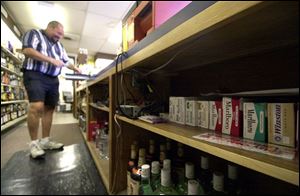
Higher prices drive Michigan smokers to Ohio
9/5/2004
Dennis Gutman rings up a sale at Clip's carryout, where the stock of cigarettes was never large but has gotten smaller.
Dorothy Wagner's trip from Palmyra, Mich., in Lenawee County to Marino's carryout on Main Street in Sylvania has become part of her regular schedule.
The cost of a pack of cigarettes went up 75 cents in Michigan on July 1, making the cost of an average pack of cigarettes in southeastern Michigan about $4.60 - $2 more than the same pack in northwestern Ohio.
For serious smokers, such as Ms. Wagner, that's a difference of about $20 a carton. Over the course of a month, cigarette expenses are approaching car payment levels for some of the state's heavier smokers.
As a result, smokers by the thousands are driving from Michigan to Ohio to buy their cigarettes and, while they're at it, other sundries.
"I think it's terrible. They're cutting their own throats," said Ms. Wagner, holding a sack containing four cartons of cigarettes - two for her and two for her daughter.
Gov. Jennifer Granholm, a Democrat, pushed for the tax hike to help pay for the loss of about $350 million in federal Medicaid funds. The Republican-dominated Legislature passed the initiative. In addition to securing an additional $315 million in revenue to help pay the state's medical bills, the Granholm administration figured the price increase would get 150,000 Michigan residents to quit smoking, saving millions through a decrease in smoking-related illnesses.
However, with the sales tax hike, the state - at $2 a pack - is second in the nation after New Jersey, which charges $2.05 in sales tax per pack. By comparison, Ohio charges 55 cents a pack in sales tax and ranks 30th nationally.
In 2001, Michigan bumped its cigarette tax from 75 cents to $1.25 a pack, starting the flow of the state's smokers to Ohio. But the recent increase of $2 has spiked the migration to out-of-this-world levels.
"Our [sales] have doubled, easily," said Chris Murray, Marino's manager.
A mile north of Marino's, just across the state line in Michigan, cigarette sales at Clip's, on Old U.S. 223, have shifted in the opposite direction. Never a large cigarette vendor in the first place, sales there have gone from a carton or two a week to two to three packs a week.
"They mostly buy them out of desperation," said Dennis Gutman, the store's manager. "One guy last week [who bought a pack] said he didn't want to deal with the traffic [in Sylvania]."
Mr. Gutman's opinion of the tax hike?
"I think it's an unfair way to try and balance the budget, to tax one [group] of people. People who smoke are going to smoke. People who live near the border have a choice, and they're going to use that choice," he said.
At Marino's, the store's cigarette salesman, who happened by, said his customers who own stores along Alexis Road have benefited greatly from the tax increase.
"I betcha they're up a good $2,000 to $3,000 a week per store," said the salesman, who requested anonymity.
His word rung true at the Alexis Beverage Center.
"[Our sales] have increased substantially," Miranda Hogan, the store's manager, said. "It's hard for me to decide what to order because I'll run out of something different every week."
Ms. Hogan said the store's overall sales have increased as smokers are buying more than just cigarettes.
Not so a few miles north, at Buddy's Mini-Mart at Secor and Sterns roads in Bedford Township, where a carton of name-brand cigarettes was $22 more than the same brand at the Alexis beverage store.
With the price differential, smuggling activity is up, particularly in the state's interior. Authorities say it's illegal to import a single pack of cigarettes that does not carry the state seal.
"There is a lot of incentive to violate the law with that big a discrepancy in price," said Lt. Jerome Solomon of the Michigan State Police's criminal investigation section.
Lieutenant Solomon directs the section's tobacco enforcement group, a five-trooper unit. He said his office is training other troopers, especially at state police posts near the border, such as Monroe, on what to look for when pulling over vehicles on routine stops.
"We're not necessarily looking for people who buy a pack or a carton but for people who are buying stockpiles," he said.
If caught, the penalties are steep: a $50,000 fine and up to five years in prison for carrying cigarettes valued at $250 or more and a $5,000 fine and up to one year in prison for carrying cigarettes valued at less than $250. Vehicles carrying smuggled cigarettes can be confiscated, he said.
The upheaval over the price hike is no surprise to officials at the many organizations that opposed it.
But Greg Bird, a spokesman for the state's budget office, said it's too early to pass judgment on the tax increase.
"We expected a decline in revenue the first couple of months because people purchase their cigarettes by other means. But I think it's important to take a look at the overall picture."
Mr. Bird said there will be an additional benefit:
"There will be a number of folks out there who will stop smoking. We will be a healthier state, and our economy will be better because we won't have to spend as much money on health care."
Contact George J. Tanber at: gtanber@theblade.com or 734-241-3610.